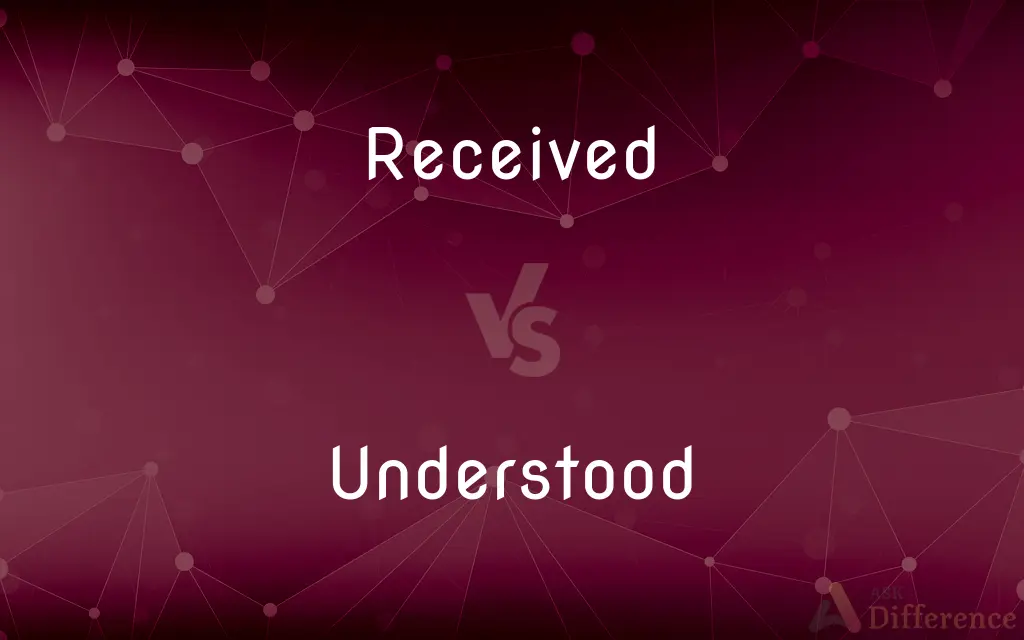Received vs. Understood — What's the Difference?
By Tayyaba Rehman — Published on October 7, 2023
Received refers to obtaining or getting something, often information or items. Understood denotes comprehension or grasping the meaning. One can receive a message without necessarily understanding it.

Difference Between Received and Understood
Table of Contents
ADVERTISEMENT
Key Differences
Received primarily denotes the action or process of getting or obtaining something. This can refer to tangible items, like a package, or intangible concepts, such as information. Someone can say they received a letter, which only implies they have it in their possession. Understood, on the other hand, pertains to comprehension, implying that a person not only received information but also grasped its meaning. For instance, one can receive instructions but may not have understood them.
In communication, especially in the digital age, the distinction between received and understood becomes even clearer. A text message might be received (indicating it has reached the recipient's device), but it doesn't guarantee that the recipient understood its content. A server may confirm that an email was received by an inbox, yet the recipient may not have opened, read, or understood its content.
Grammatically, both words can function in various capacities. "Received" primarily serves as the past tense and past participle form of the verb "receive." In contrast, "understood" acts as the past tense and past participle of the verb "understand." Both words can also be used as adjectives, albeit less commonly. For example, "received wisdom" or "an understood agreement."
From an emotional perspective, being understood often holds deeper significance than merely being received. People have an innate desire for understanding from peers, family, or society at large. In relationships, it's not uncommon to hear someone say, "I just want to be understood," emphasizing the importance of comprehension and empathy. On the other hand, "received" is more transactional and may not hold the same emotional weight.
Lastly, while both words are crucial in effective communication, they serve distinct roles. Successful communication doesn't just involve transmitting (receiving) information; it requires that the information be processed and comprehended (understood) to achieve its intended purpose.
ADVERTISEMENT
Comparison Chart
Primary Meaning
Obtaining or getting
Comprehending or grasping meaning
Linguistic Function
Past tense of "receive"
Past tense of "understand"
Usage in Communication
Acknowledgment of receipt
Acknowledgment of comprehension
Role in Relationships
Transactional
Emotional and deeper
Contextual Example
Receiving a package
Grasping the content of a lecture
Compare with Definitions
Received
To have taken or gotten possession of something.
She received the award with grace.
Understood
To have grasped the meaning or concept of something.
She understood the complex equation.
Received
To have guests or visitors.
They received their friends at the party.
Understood
To have inferred or perceived without explicit statement.
It was understood that he would pay.
Received
Acknowledgment of a communication or message.
I received your email yesterday.
Understood
To have been aware of the intent or meaning.
I understood his sarcasm.
Received
To have been subjected to an action or effect.
He received a standing ovation.
Understood
To have sympathized or empathized with.
He understood her feelings.
Received
Accepted as standard or conventional.
It's a received idea in our culture.
Understood
Past tense and past participle of understand.
Received
Having been accepted as true or worthy, especially without firsthand corroboration
"the received wisdom that attributes academic success or failure to natural aptitudes" (Jerome Karabel).
Understood
Agreed on; assumed
The understood conditions of troop withdrawal.
Received
Simple past tense and past participle of receive
Understood
Not expressed in writing; implied
The understood provisos of a custody agreement.
Received
Generally accepted as correct or true.
Understood
Having been comprehended.
Received
Conforming to the established language usage of educated native speakers;
Standard English
Received standard English is sometimes called the King's English
Understood
Simple past tense and past participle of understand
Received
Widely accepted as true or worthy;
The accepted wisdom about old age
A received moral idea
Received political wisdom says not; surveys show otherwise
Understood
Indicates comprehension on the part of the speaker.
Understood
Fully apprehended as to purport or meaning or explanation;
The understood conditions of troop withdrawal were clear
Understood
Indicated by necessary connotation though not expressed directly;
Gave silent consent
A tacit agreement
The understood provisos of a custody agreement
Understood
Regarded as tacitly agreed upon or accepted.
An understood rule between friends.
Common Curiosities
Does "received" always relate to tangible items?
No, it can refer to intangible concepts like information.
What does it mean when someone says, "It's understood"?
It means it's tacitly agreed upon or accepted without being explicitly stated.
Can someone have received a message but not understood it?
Yes, one can receive information without comprehending it.
Is "understood" only about comprehension?
Primarily, but it can also imply empathy or unspoken agreements.
Can a person be received in a place?
Yes, as in being welcomed or accepted in that place.
Is "received pronunciation" about comprehension?
No, it refers to a standard accent in British English.
Does understanding always follow receiving information?
No, one can receive information without understanding it.
If a package is received but damaged, was the delivery successful?
It was received, but not successfully in terms of its condition.
Can "received" be used as an adjective?
Yes, in contexts like "received wisdom."
Can "understood" imply a mutual agreement?
Yes, like in an "understood agreement" that isn't written but is acknowledged.
What's the opposite of "understood"?
It could be "misunderstood" or "not grasped."
Can you understand a language but not be able to speak it?
Yes, comprehension and speaking are distinct skills.
Can you understand something without receiving information about it?
Typically, some form of information or experience is needed to understand a concept.
Is "received" the same as "accepted"?
Not always. "Received" is about getting, while "accepted" is about agreeing or acknowledging.
Does "received" imply acknowledgment?
Typically, yes, especially in the context of communication.
Share Your Discovery

Previous Comparison
Meat vs. Chicken
Next Comparison
Difficulty vs. ObstacleAuthor Spotlight
Written by
Tayyaba RehmanTayyaba Rehman is a distinguished writer, currently serving as a primary contributor to askdifference.com. As a researcher in semantics and etymology, Tayyaba's passion for the complexity of languages and their distinctions has found a perfect home on the platform. Tayyaba delves into the intricacies of language, distinguishing between commonly confused words and phrases, thereby providing clarity for readers worldwide.
















































